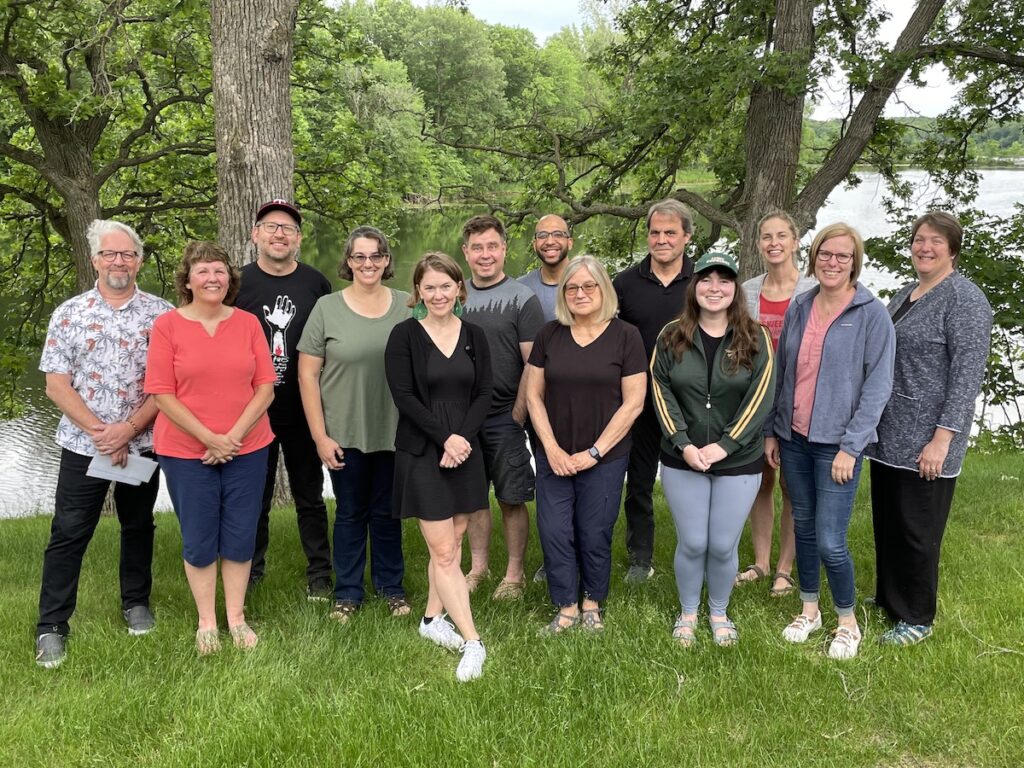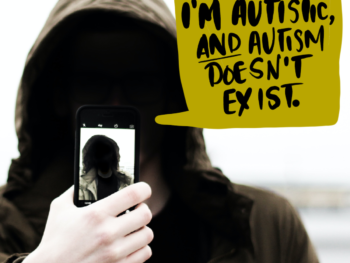This summer, I spent nearly two weeks at St. John’s University in Minnesota, at the Collegeville Institute. They offer summer writing workshops that are all-expense-paid miracles. Literally, guys: experiencing such generosity, given so freely, made it easier for me to believe in God.
Here was my two-bedroom apartment with a lake view. Ridiculously, I had this all to myself.

Here is me with my fellow writers, including our mentor/guide for the week, writer Michael McGregor (back row, in black shirt without the hat). All of these writers are dear, dear people.

All Collegeville workshops are structured differently. The rules for mine were basically “show up, and have dinner with fellow writers at night.” Apart from dinnertime, you could write—or not. Talk to fellow writers or stay holed up in your (beautiful!) apartment. Share your work or keep it secret. Do research at the library or go birdwatching.
In other words, no pressure.
I arrived with a book idea (working title: Normal, Ordinary, Enough: Leaving Achievement to Find Our Way Home) and lot of social anxiety. True story about that anxiety: About two weeks before my flight, I found myself crying in the fetal position on my kitchen floor one morning because I was so terrified of meeting the other writers.
(Another true story: I am good enough at masking that existential terror that one of the other writers told me I seem like one of the most gregarious people he’s ever met. I find that both a tremendous compliment, and also weirdly depressing. It’s not actually socially acceptable to let people know how terrified I am, but I wish it was).
Having severe social and performance anxiety is always VERY hard on the networking side of writing. Whenever I present myself to gatekeepers, or even meet fellow writers, I feel like Dorothy cowering in front of the giant face of Oz. I know, sorta, that editors and agents and publishers are just people, just like Oz was just a guy from Topeka. I have met them! Truthfully, they are usually quite lovely! But the idea of them scares the bejeesus out of me, and the terror makes it really hard for me to think straight.
- It makes it hard to know how to present myself. I always feel like I’m trying to be my own hype man, which makes me despise myself.
- It makes me hard to figure out what would sell, or be marketable, and if that thing is ALSO what I’m interested in it enough to think about it obsessively for the next three to five years (Which is what a book requires).
- It even makes it hard for me to read or research editors, journals, agents and even books from authors similar to me, because doing so with what feels like “an agenda” feels gross, and then I compare myself to all the people who -are- “successful”, and feel like crap and have to breathe into a paper bag and can’t sleep that night.
These are not sustainable feelings! So I do not research or reach out, but not feeling connected feels like crap, too.
I also have realized that, given my upbringing where success was very high stakes (literally aspiring to Broadway, a TV sitcom pilot, a professional ballet career, or a full scholarship to an Ivy League university, all of which are like aspiring to be a lottery winner) I have a very-hard-to-let-go-of snobbery that says that if an editor/agent whomever is NOT “prestigious” I will somehow embarrass myself by talking to them.
(Note: this snobbery is paired with the certainty that if they are talking to me they are DEFINITELY not prestigious.)
I told Michael a version of this while sobbing in his office. He is the type of person who makes you feel like ugly-crying in front of a stranger is socially acceptable, which is a real accomplishment! Then he gave me some very practical, kind advice that I have been thinking about ever since.
He said that publishing is all about relationships, but not in a smarmy “who you know” kind of way like I’ve been imagining. He said that all writers, including editors, are lonely, and simply having someone reach out to them in appreciation makes their day. And that kind of outreach, that kind of friendliness, often opens doors.
And that online, or with publishers, or editors, what we’re really trying to do is have conversations about the stuff that we care about. So if I contribute, and compliment, and show interest about stuff I genuinely like, I will be let in. Not because I’m prestigious, but because I’m a friend.
This is the kind of networking I could do without breathing into a paper bag. (To be honest, it still sometimes affects my sleep, but not terribly).
On the last day of the workshop, some of us were gathering for goodbyes, saying what we were taking home with us.
I said, crying (again!) that I was going to remember that editors are people too. And to actually treat them like that, and not as a cross between Oz and Harvey Weinstein.
I got home, and subscribed to a few literary journals I’ve submitted to without success for years (though some nice personal rejections, which with literary journals is like getting an A- in an AP course. It’s not shabby at all). I decided to research the editors and read their work, and then read the current issues. Then, I decided, I would write in thanking both the authors and the editors for making that art happen. And I’d keep doing that once a month or so, and keep submitting my work too.
And wouldn’t you know, I got lovely notes back from all the authors, and both of the editors. Including an editor from one of the places I’ve been submitting to for 20 years, a very wonderful and–yes!–even prestigious journal that often sends me “so close” rejection letters. That editor wrote back. And she asked if I was the Heather Caliri who writes as an “awkward Christian.”
I did not have “awkward Christian” anywhere on my email. Which meant she actually remembered me from previously submitted work. She knew me.
I reached out as a friend and found the person I had spent twenty years feeling alienated from actually knew my name.
Kindness is a real thing, guys. It is a generous, transformative force that helps us all be less afraid.
It is a miracle, wherever you find it.
It strikes me that I am almost always less alone than I am afraid I am. And that the fear of being a pariah, of being a schmuck, of being foolishly too eager to befriend people is always worse than the actual crickets I sometimes get when when I risk enough to reach out.
And the payoff when I find a hand offered generously in return? It is so worth the fear.
I am trying hard to think about my writing, my ambition, and my voice as an way of extending friendship to other human beings, not a performance to impress gatekeepers with. Seeing editors as Oz does me no favors, but just as bad, it sells them short.
I love Kate Bowler’s most recent title: No Cure for Being Human. But I also think this is true: the only cure for what ails us is actually being human. The only cure for alienation, for ugly-crying, for feeling like a schmuck, for loneliness, for yearning, for disappointment, is to be human. To be human is both to accept our vulnerability and be kind because of it. To be human is to reach out into the dark, despite the risk.
I think all of us will be surprised at how often real human beings reach back.



![quote: I suppose I don't [feel content with my creativity], as my gut response is that I'd like to be more creative. A bestselling author of a dozen books](https://www.heathercaliri.com/wp-content/uploads/2022/09/IG-quote-3-80x80.png)